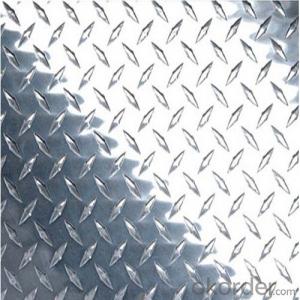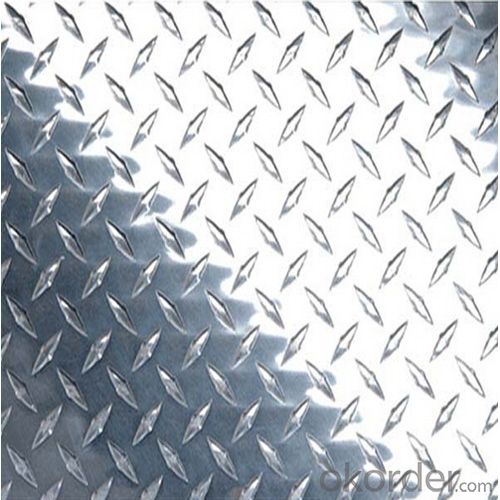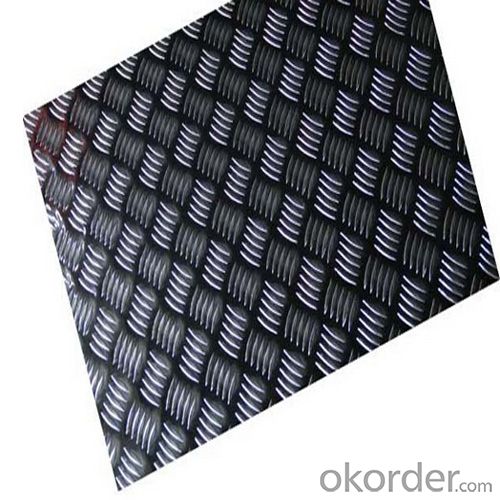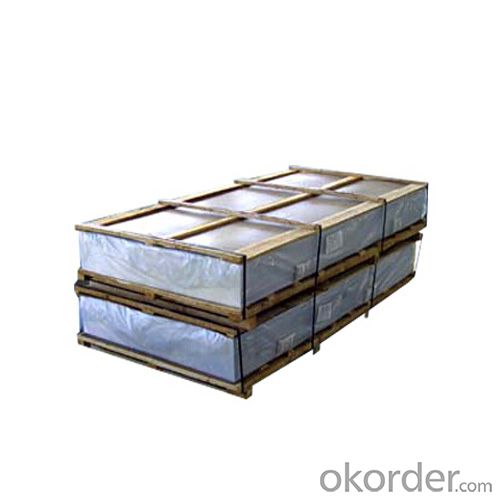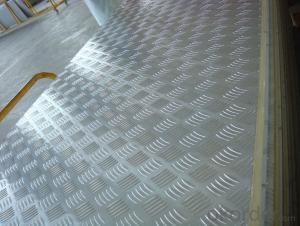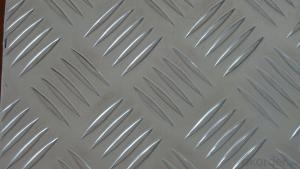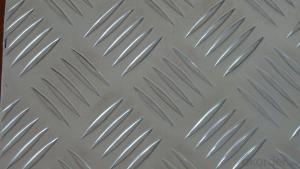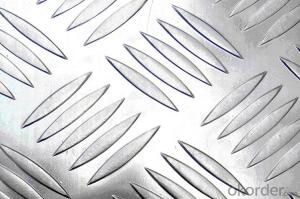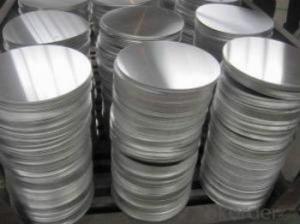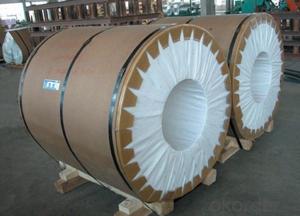Brushed Gold Anodized One Bar Diamond Aluminum Checker Plate 3003
- Loading Port:
- Shanghai
- Payment Terms:
- TT OR LC
- Min Order Qty:
- 5 m.t.
- Supply Capability:
- 10000 m.t./month
OKorder Service Pledge
OKorder Financial Service
You Might Also Like
Specification
1.Structure of One Bar Diamond Aluminum Checker Plate 3003 Description:
1050 1060 1070 1100 1235representative series aluminum plate is also known as pure aluminum, in the series in 1xxx series belongs to all the alumina quantity of a maximum number of series. Purity can achieve 99.00% above. 3xxx series aluminum represents 3003 3004,3005, 3 A21 primarily. And can be called in the 3xxx series aluminum antirust aluminum production process more outstanding. The 3xxx series aluminum plate is by manganese as the main component. Content at 1.0-1.5 between. Is a rust-proof function better series. Conventional application in the air conditioning, the refrigerator, such as car in damp environment
2.Main Features of One Bar Diamond Aluminum Checker Plate 3003 :
Low density, light in weight
Anti-corrosion
Strong
Malleable
Naturally good looking
Recyclable
3.One Bar Diamond Aluminum Checker Plate 3003 Images:
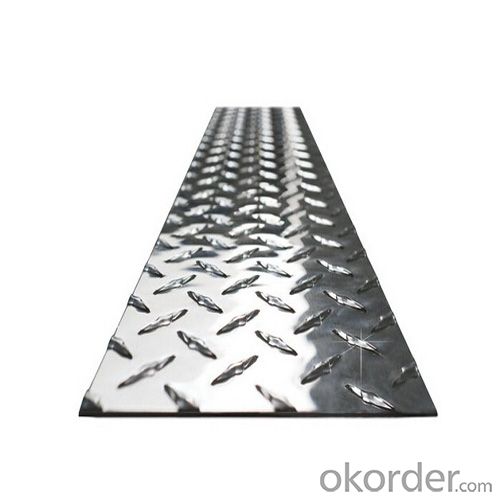
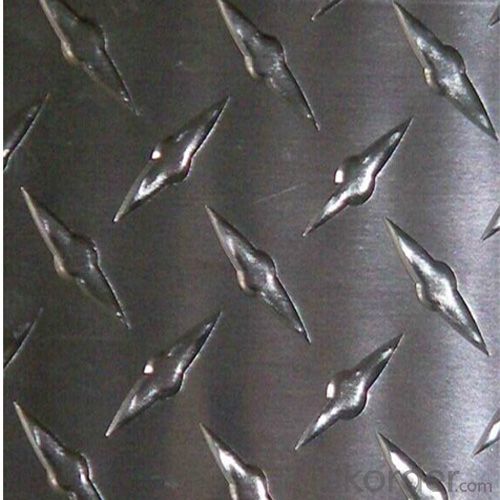
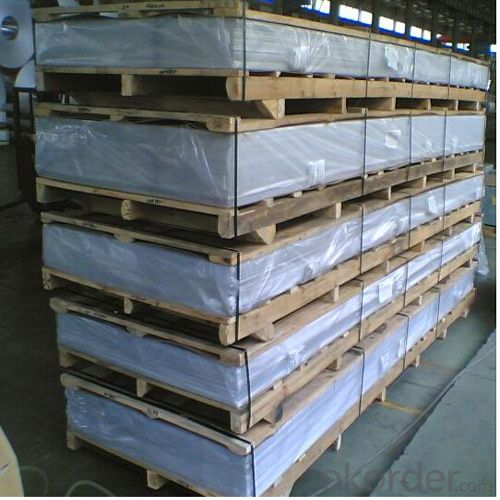
4. One Bar Diamond Aluminum Checker Plate 3003 Specification:
1. | Item | Aluminum coil/ Aluminum strip,1070 aluminium coil | |
2. | Standard | ATSTM B209, JIS H4000-2006,GB/T3190-2008,GB/T3880-2006, etc. | |
3. | Material | 1000 Series:1050,1060,1080,1100,1435,etc. | |
2000 Series:2011,2014,2017,2024,2A12,2A16,2A06,etc. | |||
3000 Series:3002,3003,3004,3104,3204,3030,3A21,etc. | |||
5000 Series:5005,5025,5040,5052,5056,5083,5A05,etc. | |||
6000 Series:6003,6060,6082,6083,6063,6061,etc. | |||
7000 Series:7003,7005,7050,7075,etc. | |||
4. | Specifications | Thickness | 0.01mm~20mm |
Width | 10mm~2000mm | ||
Length | or as required | ||
6. | Surface | Bright, polished, hair line, brush, sand blast, checkered, embossed, etching, etc. | |
5.FAQ
Q1.How long have you been in this product?
A1:More than 10 years.
Q2. What's the minium quantity(MOQ)?
A2. 5 Metric tons
Q3. How long is shipping time?
A3. 7 (ready-made products)-25 days(OEM)
Q4. How do you guarantee the quality?
A4. 1. Cooperating and Exchaning experience with sevral quoted aluminum companies
2. Japanese and Swiss production line and skilled works (regular training and testing)
3. more than 10 years production experience.
Q5. Do you have after sale service?
A5. Yes. Any quality problem occurs within one year, pls take photoes,we will be responsible.
- Q: What is made when Aluminium and Hydrochloric Acid reacts? It makes a dense white smoke with a metallic odour in the gas. Could it be dissolved amounts of Aluminium Chloride or small amounts of unreacted Aluminium in the gas? Or could be that the Chlorine (in equilibrium with HCl and HClO) made chlorates and perchlorates of aluminium that give off odours?Don't tell me the gas isn't supposed to have an odour. I know what diatomic Hydrogen smells like. Nothing. That's the way it should be. But unfortunately, that's not the way it is.
- When aluminum reacts with hydrochloric acid heat is produced as well as aluminum chloride. This heat is warming up the HCl, which you should remember is a gas dissolved in water, a little of which evolves from the water. You're smelling HCl gas. There shouldn't be any dense white smoke, unless you've got an open container of ammonia nearby. In that case the smoke is particulate ammonium chloride, produced by the reaction in the air of HCl and NH3.
- Q: Are the aluminum sheets suitable for marine vessel construction?
- Marine vessel construction greatly benefits from the utilization of aluminum sheets. With its exceptional corrosion resistance properties, aluminum proves itself as the ideal material for saltwater environments. Its lightweight nature combined with its strength strikes a perfect balance between durability and weight reduction, resulting in improved fuel efficiency and increased payload capacity. Moreover, shipbuilders favor aluminum due to its ease of fabrication, welding, and repair. Its high strength-to-weight ratio and ability to withstand extreme temperatures also render it suitable for various marine applications, including hulls, decks, superstructures, and other structural components. All in all, the use of aluminum sheets in marine vessel construction presents numerous advantages, establishing it as a favored choice within the maritime industry.
- Q: What is the tensile strength of aluminum sheets?
- The tensile strength of aluminum sheets can vary depending on the specific alloy and temper, but generally ranges from 20,000 to 45,000 pounds per square inch (psi).
- Q: which has more volume? a kg of gold or a kg of aluminum? please explain in physics terms
- Aluminum The density of Aluminum is pretty low. Gold has a very high density, almost twice as dense as iron. Density = mass / volume
- Q: Can aluminum sheets be used for bus shelters?
- Yes, aluminum sheets can be used for bus shelters. Aluminum is a lightweight and durable material that can withstand harsh weather conditions, making it suitable for outdoor structures like bus shelters. Additionally, aluminum can be easily fabricated and customized to meet the specific design requirements of bus shelters.
- Q: This question asks about the energy savings achieved by using aluminum sheets in comparison to other materials.
- <p>The energy savings achieved by using aluminum sheets instead of other materials can be significant. Aluminum is lightweight and has excellent thermal conductivity, which means it can reduce energy consumption in applications like building insulation and heat exchangers. For instance, aluminum-framed buildings can save up to 40% more energy than those made with traditional materials due to better insulation properties. Additionally, in industrial processes, aluminum's high thermal conductivity can lead to energy savings of around 33% compared to using copper in heat exchangers. The exact amount of energy saved depends on the specific application and the materials being replaced.</p>
- Q: how to distinguish the physical property of copper sheet from the one of aluminum sheet?
- physical property: copper sheet: golden, heavy, aluminum sheet: white, light.
- Q: What are the different types of surface treatments available for marine-grade aluminum sheets?
- There are several types of surface treatments available for marine-grade aluminum sheets, including anodizing, powder coating, and painting. Anodizing involves creating a protective oxide layer on the surface of the aluminum, which enhances its corrosion resistance. Powder coating involves applying a dry powder to the surface, which is then heated to form a durable and protective coating. Painting is another option, where a layer of paint is applied to the aluminum surface to provide both aesthetic appeal and protection against corrosion.
- Q: Are aluminum sheets suitable for architectural canopies?
- Yes, aluminum sheets are suitable for architectural canopies. Aluminum is a popular choice for architectural applications due to its lightweight nature, durability, and flexibility. It offers high strength-to-weight ratio, making it capable of withstanding various weather conditions and providing stability for canopies. Additionally, aluminum is highly resistant to corrosion, ensuring that the architectural canopy remains visually appealing and functional for a long time. Its malleability allows for easy fabrication and customization, enabling architects and designers to create unique and intricate canopy designs. Furthermore, aluminum is a sustainable material as it can be recycled, contributing to environmentally friendly construction practices. Overall, aluminum sheets are a reliable and versatile option for architectural canopies.
Send your message to us
Brushed Gold Anodized One Bar Diamond Aluminum Checker Plate 3003
- Loading Port:
- Shanghai
- Payment Terms:
- TT OR LC
- Min Order Qty:
- 5 m.t.
- Supply Capability:
- 10000 m.t./month
OKorder Service Pledge
OKorder Financial Service
Similar products
Hot products
Hot Searches
Related keywords
